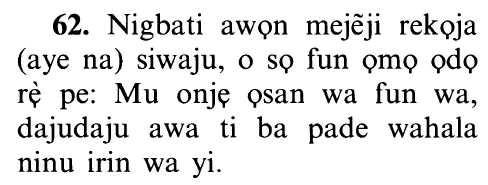18vs62
Select any filter and click on Go! to see results
فَلَمَّا جَاوَزَا قَالَ لِفَتَاهُ آتِنَا غَدَاءنَا لَقَدْ لَقِينَا مِن سَفَرِنَا هَذَا نَصَباً
Falamma jawaza qala lifatahu atina ghadaana laqad laqeena min safarina hatha nasaban
Index Terms
Click to play
Yoruba Translation

Hausa Translation
To, a lõkacin da suka wuce ya ce wa yãronsa, "Ka kãwo mana kãlãcinmu. Lalle ne haƙĩƙa mun haɗu da wahala daga tafiyarmu wannan."
Asbabu n-Nuzuul (Occasions of Revelation)
فَلَمَّا جَاوَزَا ...
So when they had passed further on,
means, past the place where they had forgotten the fish.
Forgetfulness is attributed to them both even though it was actually Yusha` who forgot.
This is like the Ayah:
يَخْرُجُ مِنْهُمَا الُّلؤْلُؤُ وَالمَرْجَانُ
Out of them both come out pearl and coral. (55:22),
although they come from the salt water, according to one of the two opinions.
When they had passed one stage beyond the place where they had forgotten the fish,
... قَالَ لِفَتَاهُ آتِنَا غَدَاءنَا لَقَدْ لَقِينَا مِن سَفَرِنَا هَذَا ...
(Musa) said to his boy-servant: “Bring us our morning meal; truly, we have suffered in this, our journey,
meaning, their journey beyond the place where they should have stopped.
... نَصَبًا ﴿٦٢﴾
Nasaban,
means, exhaustion.
وقوله " فلما جاوزا " أي المكان الذي نسيا الحوت فيه ونسب النسيان إليهما وإن كان يوشع هو الذي نسيه كقوله تعالى " يخرج منهما اللؤلؤ والمرجان " وإنما يخرج من المالح على أحد القولين فلما ذهبا عن المكان الذي نسياه فيه بمرحلة " قال " موسى " لفتاه آتنا غداءنا لقد لقينا من سفرنا هذا " أي الذي جاوزا فيه المكان نصبا يعني تعبا .
"فلما جاوزا" ذلك المكان بالسير إلى وقت الغداء من ثاني يوم "قال" موسى "لفتاه آتنا غداءنا" هو ما يؤكل أول النهار "لقد لقينا من سفرنا هذا نصبا" تعبا وحصوله بعد المجاوزة
يعني الحوت هناك منسيا - أي متروكا - فلما سأل موسى الغداء نسب الفتى النسيان إلى نفسه عند المخاطبة , وإنما ذكر الله نسيانهما عند بلوغ مجمع البحرين وهو الصخرة , فقد كان موسى شريكا في النسيان ; لأن النسيان التأخير ; من ذلك قولهم في الدعاء : أنسأ الله في أجلك . فلما مضيا من الصخرة أخرا حوتهما عن حمله فلم يحمله واحد منهما فجاز أن ينسب إليهما لأنهما مضيا وتركا الحوت .
I'raab - grammatical analysis of the Qur'an
«فَلَمَّا» الفاء استئنافية ولما الظرفية الحينية «جاوَزا» ماض وفاعله والجملة مضاف إليه «قالَ» ماض وفاعله والجملة لا محل لها جواب لما «لِفَتاهُ» متعلقان بقال «آتِنا» أمر مبني على حذف حرف العلة وفاعله مستتر ونا مفعوله الأول «غَداءَنا» مفعول به ثان ونا مضاف إليه «لَقَدْ» اللام واقعة في جواب قسم محذوف وقد حرف تحقيق «لَقِينا» ماض وفاعله والجملة لا محل لها لأنها جواب قسم «مِنْ سَفَرِنا» متعلقان بلقينا ونا مضاف إليه «هذا» الها للتنبيه ذا اسم إشارة في محل جر صفة لسفر «نَصَباً» مفعول به
